Beginner’s Guide: Bong Joon-ho, Writer & Director
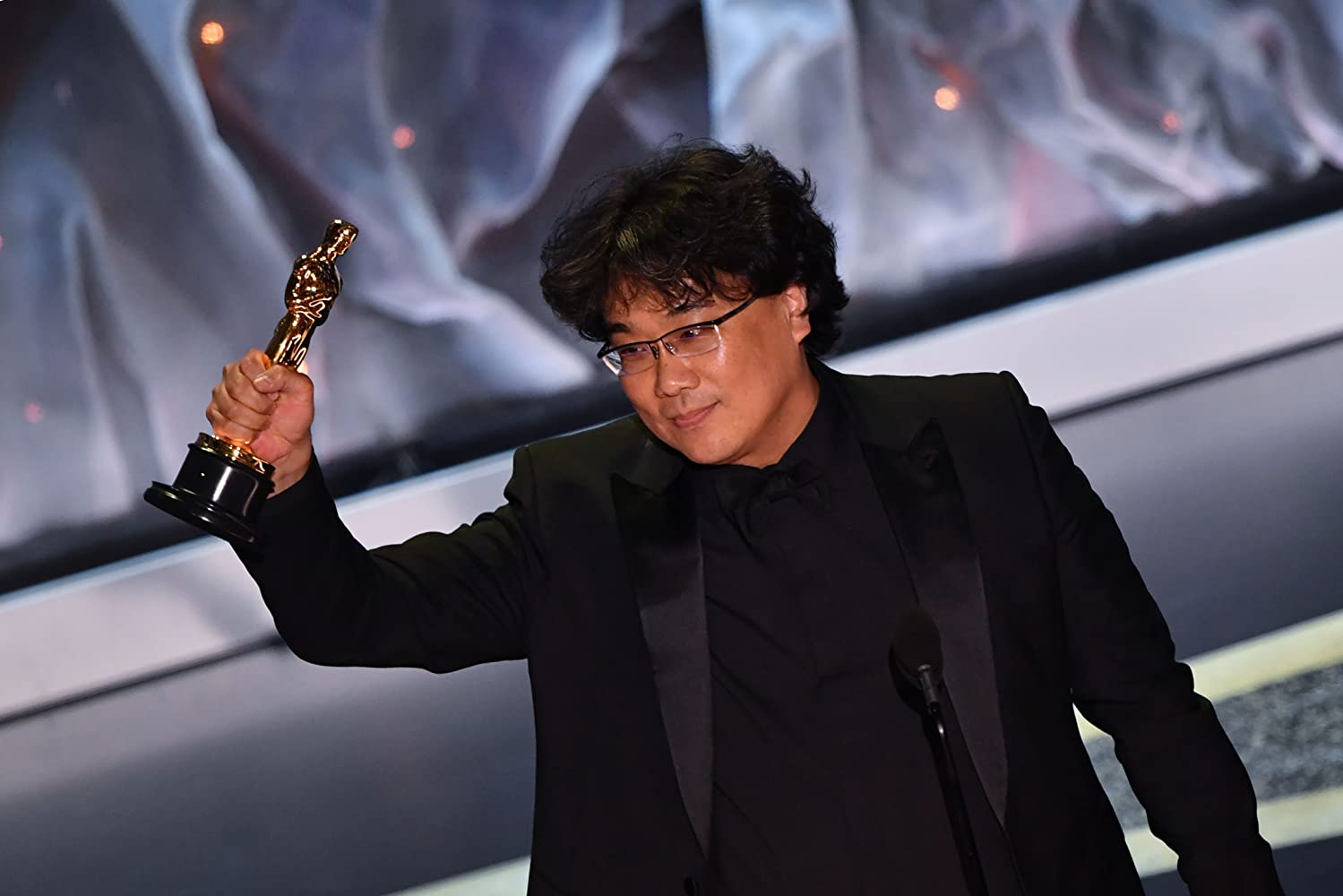
You’re never quite sure what you’re going to get when walking to experience the latest from director Bong Joon-ho. For twenty years, he’s managed to be one of the world’s most exhilarating and skilled entertainers, while also one of the cinema’s most attune satirists.
With his most recent picture, Parasite, taking home four Oscars, including Best Picture, Bong has managed to piece into the consciousness of American moviegoers in a way that few other filmmakers from South Korea have before. For those familiar with his work, the accolades, though long-deserved, come as little surprise. While unique and singular in their vision, his films have managed to express a specific pop sensibility.
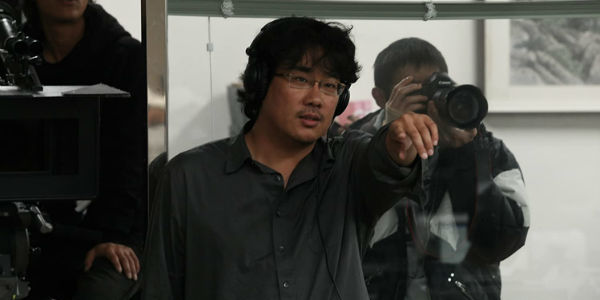
One of Bong’s distinctive trademarks has always been his impressive ability to jump between various genres, often subverting our expectations while infusing them with his c*cktail of political satire. It’s a skill that’s managed to make him a much more accessible steward to Korean cinema for outside audiences than pulpy and provocative Park Chan-wook (Oldboy, The Handmaiden), or the often meditative and austere Lee Chang-dong (Poetry, Burning).
Even filmmaker (and cinema archeologist) Quentin Tarantino compared Bong to the likes of one of the mediums great pop-artists. “Of all the filmmakers out there in the last 20 years, he has something that [1970s] Spielberg has. There is this level of entertainment and comedy in his films,” said Tarantino at the Busan International Film Festival in 2013.
Now, with his newfound Oscar glory, Bong’s earlier filmography is ripe for rediscovery, and a beginner’s guide to his career all the more relevant.
Barking Dogs Never Bite (2000)
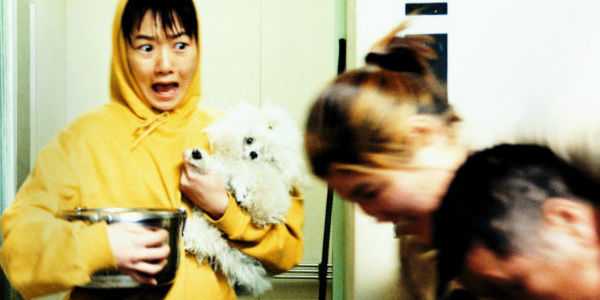
While decidedly more modest than his work that would follow, Bong’s first feature still offers some impressive commentary, along with a window into what will become stylistic strengths of his other films. Here, his protagonist is a distressed grad student, who begins to take out the anxieties of day-to-day life on a continually barking dog that resides in his apartment complex. Things inevitably spiral out of control with a series of pet kidnappings, as the protagonist pains himself to find the yapping canine driving him to the edge.
Barking Dogs Never Bite ultimately becomes about the notion that the most ordinary of individuals can dissolve into psychotic behavior thanks to the trappings of everyday living. Of course, it’s all played for comedic effect, demonstrating Bong’s ever-impressive ability to pull comedy out of the darkest of subject matters.
And, while many viewers are likely to find the sequences of animal torture to be too shocking or unsettling, it does play to arguably the movies most unique idea. It’s hard not to see a commentary on the way we view violence against animals vs. violence against people in our entertainment. A man murdering off individuals in a crowded apartment complex becomes a pulpy serial-killer flick, but dogs? That’s seen as cruel and merciless.
For those captivated by Bong’s Oscar-winning Parasite, Barking Dogs Never Bite offers a familiar mastery of space and location. Just as the luxury home in his most recent picture becomes a character in of itself, the apartment complex in Barking Dogs Never Bite becomes a key visual element in the film. The camera winds through the various hallways and corridors, while also allowing characters to voyeuristically spy on one another through opposing balconies and hidden crevices.
Memories of Murder (2003)
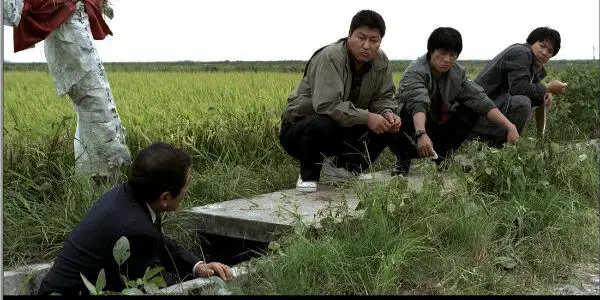
Arguably one of his finest masterpieces, Memories of Murder loosely recounts the investigation into South Korea’s first documented serial killer in the mid-80s. However, Bong isn’t interested in serving up a feast of visceral violence to his audience. There’s no masked killer butchering teenagers venturing into abandoned homes. Nor is there the cat-and-mouse mind games of such Hollywood serial killer flicks as Silence of the Lambs or Se7en.
Bong uses the framework of a police procedural to explore tensions between South Korea’s rural and urban populations, as a small-town detective played by Bong’s regular leading man, Song Kang-ho, is forced to work with a city cop whose new methods feel almost alien. It’s a conceit that allows ample opportunity for Bong to let the detectives opposed methods of his two detectives bounce off each other for comedic effect.
Of course, there’s also a biting critique of government bureaucracy and how it can hinder good police work and any real sense of efficiency. But, the movie operates as more than just a satirical cop-picture. Memories of Murder is arguably Bong’s most masterful picture in terms of tone, evolving from tense thriller, hilarious satire, and deep poignancy often within a single scene. At times it feels like the picture before you is a living organism, morphing and molding before you like a piece of organic material. It shouldn’t work and certainly shouldn’t feel of once piece, and yet, magically, it does.
Ironically, the movie that’s been seen as the closest companion piece to Memories of Murder would be one released four years after its release, David Fincher’s Zodiac. Both films end with a lack of resolution, neither or their killers in hand-cuffs or behind bars. Instead, they become poetic tales of lawmen grappling with the idea that the methods they’ve relied on for years are inefficient in the face of unprecedented evil.
The Host (2006)
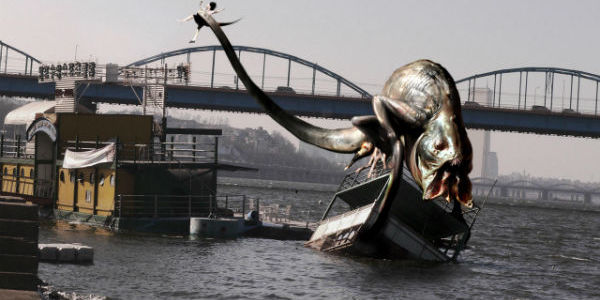
If Bong is his generation’s Steven Spielberg, then this might be his Jaws, a ferocious work of monster-movie pulp elevated to the highest art. But, while Spielberg teases us with his beastie, Bong sets his loose in an expertly choreographed set-piece within the first act.
The monster here, some kind of mutated river-beast, is the product of corporate neglect. It’s an apt allegory for the environmental destruction thrown upon innocent people by corporate and governmental neglect. It’s a familiar trope in monster movies going back decades, though now the allegory of The Host seems even more prescient in the context of climate change and the way many in power have chosen to turn a blind eye. At the same time, average citizens are forced to atone for the accumulated consequences.
While other pictures of its kind would choose to scientists of military officials as their heroic protagonists, The Host subverts, painting these groups as either incompetent and underprepared, or authoritarian in the way they attempt to regain control over a Seoul eclipsed by fear and chaos. Bong grew up in South Korea during an era of U.S. military occupation, and the ripple effects and anxieties of that era are most present here than any of his other films.
However, while The Host allows for plenty of political and ecological readings, it’s first and foremost a thrilling, at times darkly funny blockbuster. For American audiences, the film was commonly described as Godzilla by way of Little Miss Sunshine, with the movie’s protagonists being a dysfunctional family who must put aside their differences and come together to rescue the young daughter, who has been taken by the beast in one of the film’s frightening early scenes.
Mother (2009)
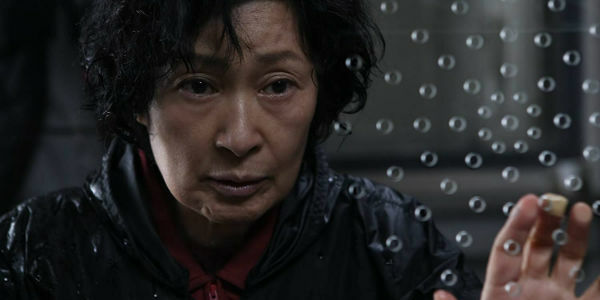
After the international acclaim and success of The Host, Bong returned to a more modestly scale thriller, one yet again about the hunt for a woman’s murderer. However, this time the central protagonist isn’t a police-detective as in Memories of Murder, but an elderly woman desperate to clear her the name of her mentally-handicapped son, who’s found himself in prison as the chief suspect in the crime.
For the bulk of its runtime, Mother takes its cues from gum-shoe detective movies, with their protagonists using their resourcefulness to uncover clues without the red tape and bureaucracy that can come with typical police work. While the beats of rhythms in Mother’s storytelling feel straight within this respected genre, the subversion comes in the protagonist Bong places at the movie’s center.
However, it’s in the film’s final moments where Mother unfolds into something much darker and far more provocative. The movie’s chief protagonist, played by Hye-ja Kim, must face the possibility that her son may have indeed committed the crime. How far and to what horrific extremes a mother’s love for her son will go becomes the central question at the heart of this uniquely twisted character study.
Snowpiercer (2014)
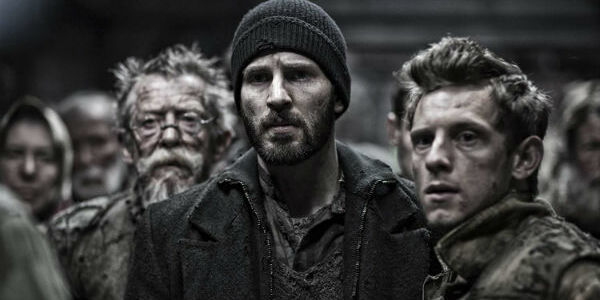
It’s curious to think that Bong’s first English language film might be one of his most underrated. Due to back and forth tensions with producer Harvey Scissorhands (or Weinstein as you may know him), the film received a much smaller release than it likely deserved, with most audiences seeing it through Video On Demand. Weinstein, ever the bully, sparred with the Korean auteur over the final cut of the film, with Bong going as far as to lie about certain scenes to ensure his full vision was intact.
On the one hand, Snowpiercer lacks the subtlety of Bong’s most celebrated works. It’s adapted from a French comic about a post-apocalyptic world covered in ice, where the only refuge of mankind is on a speeding train that circumnavigates the planet. However, onboard, a rigid class divide still holds. Those who are poor reside in the back, while those up front enjoy the spoils of more civilized time. Chris Evans, taking a break from his Captain America gig, leads the charge as the back fights its way car by car to a more prosperous future. Or so they think.
Snowpiercer’s class satire is broader and more surface-level when compared to something like The Host or even Parasite. However, the high-concept sci-fi and impressive world-building present plenty of cinematic pleasures for Bong to indulge in. Each car on the train acts as its creative eco-system filled with surreal, dazzling, and even grotesque imagery. One car serves as an aquarium, another a nightclub, a third, a school that brainwashes the train’s children in cult-like fashion.
All in all, the experience of watching Snowpiercer is one that calls to mind the dystopian worlds of movies like 12 Monkeys and Brazil, with Bong even paying homage to their director, Terry Gilliam, in the form of a character of the same name played by John Hurt. What the film lacks in subtlety, it makes up for in wild, darkly askew imagery.
Okja (2017)
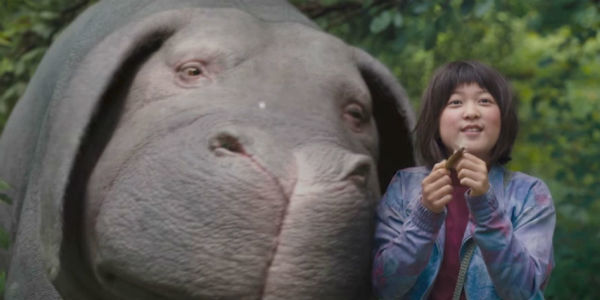
Bong brings his unique satirical commentary to the corporate meatpacking industry, and animal rights activism through the story of a young girl and her lovable “super-pig.” Throughout his career, Bong’s greatest strength as a filmmaker has likely been his impressive control of tone, as mentioned earlier with Memories of Murder. However, here the mixture becomes like oil and water.
Okja’s earlier sections seem to evoke the style of Amblin Entertainment in the mid-1980s, family-friendly adventure with only the mildest sense of danger. But, things become more off-kilter with the addition of some of the films English-speaking character, namely Tilda Swinton and an unusually over-the-top Jake Gyllenhaal. Bong’s films are often ripe with unexpected comedy, but whenever Gyllenhaal and Swinton are on screen, the movie morphs into a Simpsons episode.
The movie falls further off-balance once it begins to take a darker turn in its second half. The sense of wonder and mad-cap energy gives way to an Orwellian depiction of food manufacturing, filled with haunting, at times incredibly gruesome imagery. While Bong’s ability to weave together terror, comedy, and political commentary typically create a wonderous atmosphere of unpredictability within scenes, here it feels disjointed and at odds with itself.
Yet, even as Bong struggles to meld together the dueling tones of Okja, the film presents several expertly choreographed sequences, namely an extended chase through a metropolitan city that feels about as close as the Korean auteur has come to going full Spielberg.
Parasite (2019)
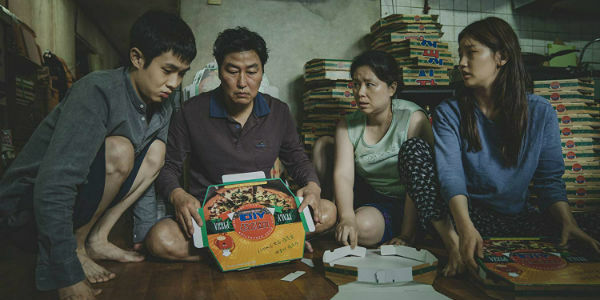
There’s a sequence mid-way Bong Joon-Ho’s recent Oscar winner that revolves around the preparation of a dish called “Rom-Don.” It’s a hyper-specific joke, though one many non-Korean audiences (including yours truly) may not have even noticed. “Rom-Don”, as it turns out, is just Jjapaguri, a popular cheap and easy snack that combines two different forms of instant noodles.
What makes the dish different this time around, though, is the addition of ribeye, transforming a common, inexpensive form of food into a flaunting of one’s wealth. As a recent episode of the web series Binging With Babish put it, it’s the equivalent of putting truffles on a big-mac.
The Rom-Don in Parasite is a subtle critique of the way those with wealth often appropriate typical working-class food, tweaking its ingredients to flaunt wealth. In the end, an attempt to “elevate” something becomes a sign of ignorance toward the strife and socio-economic circumstances that led to the dish being.
And, that is the crux of what the film, which for the sake of spoilers, I’ll describe as the story of a poverty-stricken family conning their way into the employment of a naive wealthy one. What makes Parasite such are marvel is its ability to be enjoyed on both visceral and thematic terms. As evident by the Rom-Don example above, Bong has layered his satire into the tiniest, most insignificant moments.
As much as Parasite’s Best Picture win feels like a game-changing moment for the Academy Awards, its success and resonance also feel inevitable. Nearly everyone who I’ve met who has seen the movie feels and ecstatic need not just to talk about it but to dissect it. Capitalism, climate change, cultural appropriation, it’s all there for the unraveling but never in a way that feels like Bong beating you over the heading.
Even more significant is that Parasite’s just an electric movie-going experience, the kind that makes people want to jump out of their seat with enthusiasm. Ever moment, neigh, ever shot, every camera movement, every placement of objects and characters within the frame is designed for maximum impact.
Final Thoughts
So, with a newfound level of popularity and several Oscars under his belt, where does Bong go from here? Thankfully, there’s little indication Bong will find himself sucked into the franchise machine, choosing between a Beverly Hills Cop remake or a fifth Men In Black picture. He’s too independently minded. Plus, when asked whether or not he’d ever direct a comic-book picture, he humorously replied:
“I have a personal problem. I respect the creativity that goes into superhero films, but in real life and movies, I can’t stand people wearing tight-fitting clothes. I’ll never wear something like that, and just seeing someone in tight clothes is mentally difficult. I don’t know where to look, and I feel suffocated. Most superheroes wear tight suits, so I can never direct one. I don’t think anyone will offer the project to me either. If there is a superhero who has a very boxy costume, maybe I can try.”
Instead, Bong’s international success with Parasite could mean a blank check, or at least a sizably larger budget, to work with on whatever project he wants to tackle next. For many Best Director winners, having a little gold man on your resume can mean the addition of another zero on your next film’s budget, or the opportunity to attract larger named talent. For now, the doors of Hollywood are open, and likely without the same studio roadblocks and pains that have plagued the Korean auteur in the past.
But what do you think? What kind of genre should Bong Joon-ho tackle next? Should his next project be with Hollywood stars, or should he continue to work with South Korean talent?
Does content like this matter to you?
Become a Member and support film journalism. Unlock access to all of Film Inquiry`s great articles. Join a community of like-minded readers who are passionate about cinema - get access to our private members Network, give back to independent filmmakers, and more.













